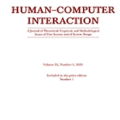The opaque nature of many intelligent systems violates established usability principles and thus presents a challenge for human-computer interaction. Research in the field therefore highlights the need for transparency, scrutability, intelligibility, interpretability and explainability, among others. While all of these terms carry a vision of supporting users in understanding intelligent systems, the underlying notions and assumptions about users and their interaction with the system often remain unclear. We review the literature in HCI through the lens of implied user questions to synthesise a conceptual framework integrating user mindsets, user involvement, and knowledge outcomes to reveal, differentiate and classify current notions in prior work. This framework aims to resolve conceptual ambiguity in the field and enables researchers to clarify their assumptions and become aware of those made in prior work. We thus hope to advance and structure the dialogue in the HCI research community on supporting users in understanding intelligent systems.
翻译:许多智能系统的不透明性质违反了既定的可使用性原则,因而对人与计算机的互动构成挑战。因此,实地研究强调,除其他外,需要透明度、可观察性、可洞察性、可解释性和可解释性。所有这些术语都具有支持用户理解智能系统的愿景,但关于用户及其与系统互动的基本概念和假设往往仍然不清楚。我们从隐含的用户问题的角度来审查HCI的文献,以综合一个概念框架,将用户的思维、用户参与和知识成果结合起来,揭示、区分和分类先前工作中的当前概念。这个框架旨在解决实地概念上的模糊性,使研究人员能够澄清其假设,了解先前工作中的假设。因此我们希望推动和安排HCI研究界关于支持用户理解智能系统的对话。





